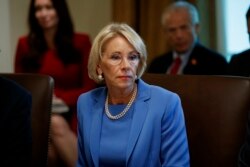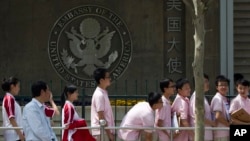Student Union
Anti-Semitism Complaint Spurs University of North Carolina to Update Policies
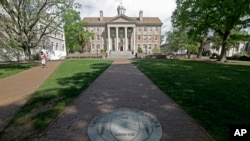
The University of North Carolina at Chapel Hill has agreed to expand its anti-bias training and expressly forbid anti-Semitism in campus policies as part of an agreement with the U.S. Education Department following complaints about a March conference featuring a rapper accused of anti-Jewish bias.
The university announced the changes Monday after reaching a resolution with the department's Office for Civil Rights. The deal puts an end to the inquiry without any admission of wrongdoing on the school's part, and without any official finding from the department on the allegation of illegal discrimination.
Interim Chancellor Kevin Guskiewicz reiterated that the university will not tolerate any form of harassment, and he encouraged students and faculty to report any problems.
"I reaffirm the university's commitment to creating a place where every member of our community feels safe and respected and can thrive in an environment free from anti-Semitism and all forms of discrimination and harassment," Guskiewicz wrote in a letter that was sent across campus Monday.
Under the agreement, the university must add a statement to its policies saying that anti-Semitic harassment is prohibited and may violate federal law. The school's current rules prohibit discrimination based on religion or ethnic ancestry but do not specifically address anti-Semitism.
The school is also required to add a new section on anti-Semitism to existing training programs for students, faculty and staff. And for each of the next two academic years, the university must hold at least one campus meeting to discuss any concerns about anti-Semitism or other forms of harassment.
A Nov. 6 letter from the Education Department says the provisions detailed in the agreement will "fully resolve the issues giving rise to the complaint."
'Heartbroken and deeply offended'
The agency opened a civil rights investigation after receiving a complaint about a March academic conference titled "Conflict Over Gaza: People, Politics and Possibilities." The event included a Palestinian rapper who performed a song that some critics called anti-Semitic. The university's chancellor said the performance left him "heartbroken and deeply offended."
Two weeks after the conference, anti-Semitic flyers were found on campus warning of an "evil Jewish plot to enslave and kill," according to the Education Department. The complaint argued that the school's support of the conference amounted to discrimination against students of Jewish descent. It said the flyers were further evidence of a "hostile environment" created by the event.
On April 15, U.S. Rep. George Holding, a North Carolina Republican, wrote a letter to Education Secretary Betsy DeVos raising concerns that the conference was supported with federal grant funding. He described the rap performance as "brazenly anti-Semitic."
In response, DeVos ordered a separate investigation examining the organization behind the conference, the Duke-UNC Consortium for Middle East Studies, which is housed at UNC and jointly operated with Duke University.
Grant money
That inquiry, which is still ongoing, aims to determine whether the consortium is properly using a federal grant that's awarded to dozens of universities to support foreign language instruction. The Duke-UNC consortium received $235,000 from the grant last year.
An Aug. 29 letter from the department threatened to cut the program's grant funding, saying the consortium offered too many classes on art, film and culture and not enough on Middle Eastern languages. It also said the program promoted "positive aspects" of Islam but not other religions.
Officials at UNC rebuffed the claims, saying the program has hosted events including a visit to a Jewish center to explore Jewish traditions, and presentations on Christianity in Lebanon. The school also said it ranks among the top in the nation in enrollment of students studying the Arabic, Turkish and Urdu languages.
Still, the school agreed to review the program's activities and document how its expenses relate to the goals of the federal grant.
In October, the department agreed to release grant money to the program for next year, but a department spokeswoman on Tuesday said future funding beyond that could be in question.
The inquiry has provoked a wide outcry from academic groups and free speech advocates who call it a threat to academic freedom. Two Democrats in Congress have asked DeVos to provide information on the inquiry, saying it's dangerous to tie federal funding to specific curriculum demands.
The Middle East Studies Association recently called the investigation "an unprecedented and counterproductive intervention into academic curricula." But in a response to the group, Robert King, the assistant secretary for postsecondary education, said the department has a duty to make sure grants are being used for their intended purpose.
"Federal grants are not blank checks from public coffers," he said, "and the department intends to ensure that taxpayer funds are spent in alignment with Congressional directives."
See all News Updates of the Day
- By VOA News
International students discuss US campus culture shock

International students at De Anza College in Cupertino, California, talked about culture shock in an article in La Voz News, the student newspaper.
"It felt like a major culture shock. Everything was so different, from academics to mannerism," said a student from Mexico.
Read the full story here.
These are the most expensive schools in the US
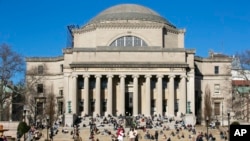
High tuition costs along with housing and food expenses can add up for students at U.S. colleges and universities.
MSNBC looked at the most expensive schools in the country, with one costing more than $500,000 for a bachelor’s degree. (June 2024)
Uzbekistan students admitted into top US universities
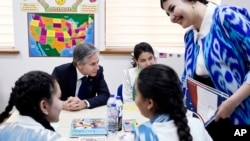
Students from Uzbekistan are among the international students admitted to top colleges and universities in recent years.
Gazata.uz profiled some of the Uzbekistan students attending Harvard, Brown, Princeton and other U.S. universities. (June 2024)
- By Stella Hsu
Reports of visa checks, deportations worry Chinese STEM students in US
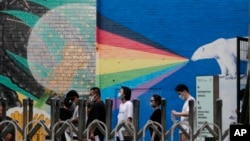
Geopolitical tensions and growing competition in tech between the United States and China appear to be spilling over into academia despite commitments from the world’s two biggest economies to boost people-to-people exchanges.
The United States remains the top choice for Chinese students seeking to study abroad with nearly 300,000 studying in American colleges and universities during the 2022-2023 school year. But reports of some cases that students and professors are facing extra scrutiny while passing through immigration and the deportation of others are raising concerns.
For Chen Xiaojin, a doctoral student studying semiconductor materials at a university in the Washington, D.C., metropolitan area, it has been six years since she returned to her hometown of Beijing.
At first, it was the COVID-19 pandemic that kept her from going home. But over the past two years, she has been deterred by accounts of Chinese students majoring in science and engineering being required to reapply for their visas upon returning to China.
She also says she is worried by reports over the past six months of Chinese students being deported, even at nearby Dulles Airport.
"My current research is relatively sensitive, and my boss [adviser] is getting funds from the U.S. Department of Defense, making it even more sensitive,” she told VOA. "I am afraid that I won't be able to return after I go back [to China]."
Chen says that if she did return to China, she would have to apply for a new visa.
In a report late last month, Bloomberg said it had found at least 20 Chinese students and scholars with valid visas who were deported at U.S. Customs since November and barred from reentry. The U.S. Customs and Border Protection Agency does not release relevant data.
Immigration attorney Dan Berger represented one Chinese student who was deported late last year. He tells VOA Mandarin that the student studied biological sciences at Yale University and was about to complete her doctorate.
She visited her family in China and got a new visa but was deported by customs at Dulles Airport and barred from reentering the country for five years. Berger said he did not see anything suspicious in the transcript of the conversation between the student and the customs officer.
"We have seen what seems like a pattern over the last six months of Chinese PhD students being turned around…. more than I've seen in quite a while," he said.
Matthew Brazil, a fellow at the Jamestown Foundation, said neither country seems willing to explain the situation. However, he believes that in most cases, the United States must have valid reasons for blocking visa holders from entering the country.
In some cases, the student’s background may not match what is written on the visa application. In other cases, customs agents may also find something that the State Department missed, and once they see it, they are responsible for taking action.
"I wish the Chinese side would be specific about their students who were refused entry,” he said. “The fact that both sides are mum on details and that the Chinese side is engaged with the usual angry rhetoric means that each has security concerns. And that says to me that there was good reason for the U.S. to stop these particular applicants."
Brazil also sees a connection between the entry denials and export control regulations issued by the United States in October 2022 that restrict China's ability to obtain advanced computing chips, develop and maintain supercomputers, and manufacture advanced semiconductors.
U.S. Customs and Border Protection is one of the law enforcement agencies authorized to investigate violations of export control regulations, he said.
"Beijing's intelligence agencies are known to focus attention on PRC [People's Republic of China] students and scientists headed abroad who study or work on dual-use technologies controlled under the Export Administration Act — compelling Chinese students and scientists to report on what they've learned when they return to China on holiday,” he said. “This has been true for decades."
Bill Drexel, a fellow for the Technology and National Security Program at the Center for a New American Security, said the U.S. government did find some cases where students tried to steal strategic technology for China.
"I think it would both not be surprising that they found some really questionable or incriminating evidence for some students,” he said. “It would also not be surprising if, in their hunt for really solid evidence, they also may have made some mistakes on other students.”
Drexel adds that “it’s just kind of an unfortunate fact of the time that we live in and the tactics that the CCP uses when it comes to these measures."
In a post on X in early May, U.S. ambassador to China Nicholas Burns tried to dispel concerns about visas and entry to the United States for students and scholars. In the post, he said "99.9% of Chinese students holding visas encounter no issues upon entering the United States.”
In an interview with The Wall Street Journal Monday, Burns said it is China that is making it impossible to promote people-to-people ties. Burns told the Journal that students attending events sponsored by the United States in China have been interrogated and intimidated.
He also said that since U.S. President Joe Biden and China’s leader Xi Jinping held their summit in San Francisco last year, China’s Ministry of State Security and other agencies had interfered with Chinese citizens’ participation at some 61 events.
At a regular briefing on Wednesday, Chinese Foreign Ministry spokesperson Mao Ning dismissed those accusations, saying that they did not “reflect reality" and that went against key understandings reached by both countries’ presidents in San Francisco.
“The United States, under the pretext of 'national security,' unjustifiably harasses, interrogates, and deports Chinese students in the U.S., causing them significant harm and creating a severe chilling effect,” Mao said. “The image of the United States in the minds of the Chinese people fundamentally depends on the actions of the United States itself.”
Drexel said he believes Burns’ comments about visas and students' willingness to study in the U.S. still ring true.
“On balance, it's still the case that American universities are overwhelmingly warm towards Chinese students and want them in large numbers," he said.
However, Berger, the immigration lawyer, is concerned about the chilling effect recent cases involving Chinese students could have.
"In general, we are being more careful about advising Chinese graduate students in STEM fields about traveling and letting them know that there is some small risk,” he said.
Even though the risk is small, it does seem to be real at the moment, he said.
Adrianna Zhang contributed to this report.
US federal judge blocks new regulation targeting for-profit colleges
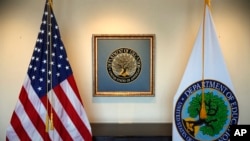
A federal judge in Texas has blocked a regulatory provision targeting for-profit colleges that was scheduled to take effect in July 2024.
Times Higher Education reports that the rule, which would affect student loans, was challenged by for-profit institutions. (June 2024)




